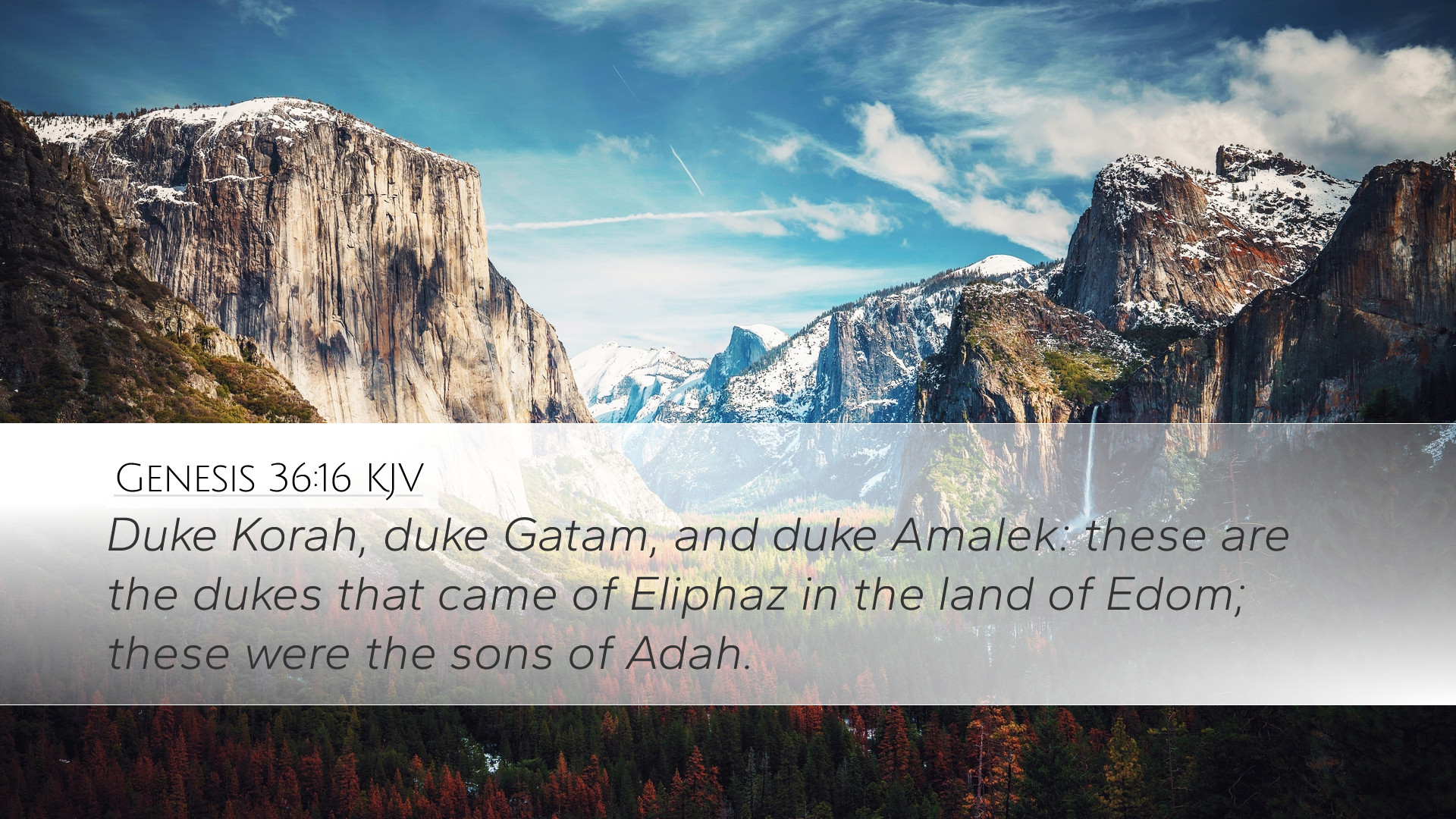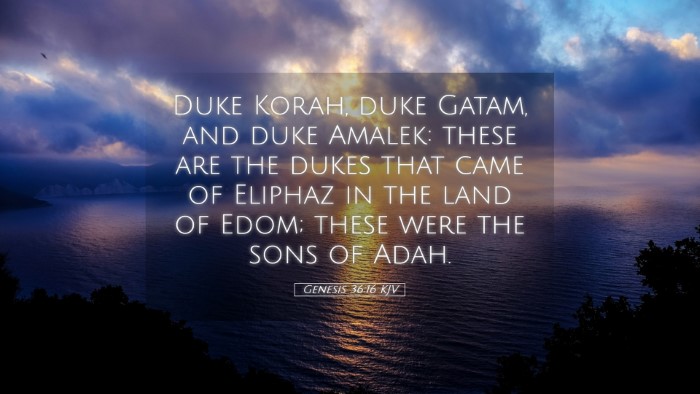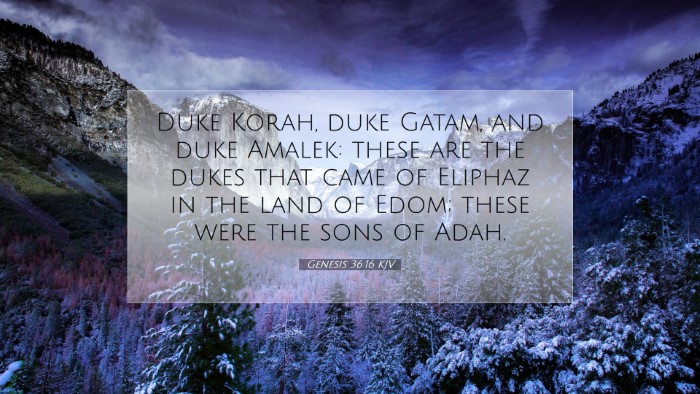Commentary on Genesis 36:16
Verse Reference: Genesis 36:16 - "Duke Korah, Duke Gatam, and Duke Amalek: these are the dukes that came of Eliphaz in the land of Edom; these were the sons of Adah."
Introduction
This verse marks an important part of the genealogical account of the descendants of Esau, showcasing the structure of leadership in Edom and highlighting the significance of lineage in biblical history. The mention of 'dukes' indicates a royal or noble lineage among the descendants, particularly pertaining to the sons of Adah, one of Esau's wives.
Contextual Background
Genesis 36 records the descendants of Esau, who is also called Edom. This chapter provides a comprehensive list of Esau's descendants, showing the tribes and chiefs that emerged from him. It is essential to understand that genealogies in the Bible serve several purposes, including establishing historical continuity, God's covenant faithfulness, and the unfolding of redemptive history.
Key Themes and Insights
-
The Significance of Esau's Lineage
Esau, though he is often seen in contrast to his brother Jacob, plays a critical role in the narrative of God's people. The passage reflects on how even outside of the covenant people of Israel, God is still working through nations and dynasties. The titles 'dukes' signify leadership and governance, indicating that Esau's descendants formed an organized society.
-
The Importance of Names
The specific names listed—Korah, Gatam, and Amalek—are significant. Amalek, in particular, becomes a prominent enemy of Israel. The mention of these names foreshadows future interactions between these descendants and the nation of Israel, illustrating God’s overarching plan for the nations.
-
Understanding 'Dukes'
The term 'duke' here represents a chief or leader. This designation reflects the tribal structure of the Edomites, signifying that they were organized into clans, each headed by a chief. The role of a duke in ancient near-Eastern cultures often involved both military and political responsibilities, providing insights into how the Edomites operated as a united community.
Commentary Insights
Matthew Henry's Perspective
Matthew Henry offers valuable insights regarding the choice of names and the implications of the leadership structure within Edom. Henry emphasizes that even though Esau was the lesser of the two brothers in terms of covenantal promise, his lineage still bore significant numbers and influence. In his observations of the verses prior, Henry notes the fulfillment of God's promise to Abraham that from him would come nations, which includes the descendants of Esau.
Albert Barnes' Interpretation
Albert Barnes reflects on the implications of the social structures within the Edomite community. He points out that the classification of clans into 'dukes' reveals a society that was well-organized and potentially influential. In his comments, he draws attention to the ongoing tensions between the Edomites and the Israelites, suggesting that the mention of these dukes serves as a warning and a reminder of the historical conflict that was to unfold.
Adam Clarke's Analysis
Adam Clarke takes a more genealogical approach, explaining the lineage of each duke raised in this verse. He elaborates on the historical significance of Amalek, tying it back to the greater narrative of Israel’s journey through the wilderness and the battles they faced from this lineage. Clarke notes how the scripture serves as both a record and a prediction of the animosities that would arise between Israel and the descendants of Esau, eventually culminating in divinely orchestrated confrontations.
Theological Implications
The genealogical emphasis found in Genesis 36:16 serves multiple theological functions:
-
Covenantal Promises: The descendants of Esau serve as a reminder of God's expansive promises that go beyond Israel, revealing His sovereignty over all nations, even those outside the covenant community.
-
God's Providence: Recognizing the leaders that emerge from Esau’s lineage emphasizes that God is providentially orchestrating history, guiding nations and families according to His divine will.
-
Conflict and Resolution: The foretelling of strife between these descendants fosters contemplation on the nature of sin and conflict within human families—a theme that resonates throughout scriptural narratives and emphasizes the need for redemption.
Application for Today
For pastors and church leaders, this passage encourages reflection on the roles of legacy and lineage in our communities. It challenges the modern church to consider the importance of spiritual heritage and the impact of family lineage in shaping faith dynamics within congregations. Here are some applicable insights:
-
Understanding Heritage: Just as God includes the lineage of Esau in His plan, church leaders should recognize the importance of each individual's story in the context of discipleship.
-
Recognizing Conflict: The historical animosities between the Edomites and Israelites encourage modern Christians to confront conflicts within their communities with a redemptive lens, seeking resolution and understanding.
-
Emphasizing Purpose: Every name and person in Scripture emphasizes God’s purpose in history. Leaders should instill in their congregations the understanding that each member is part of a larger story of God’s work in the world.
Conclusion
Genesis 36:16 serves not only as a genealogical marker but also as a reminder of God’s sovereignty and providence in every aspect of human history. It emphasizes the importance of understanding our heritage, the significance of our names, and acknowledges the potential for conflict as part of the human experience. This verse invites reflection on the way God weaves diverse narratives into His greater redemptive plan, and challenges theologians, scholars, and practitioners to find meaning in the lineage of faith.


